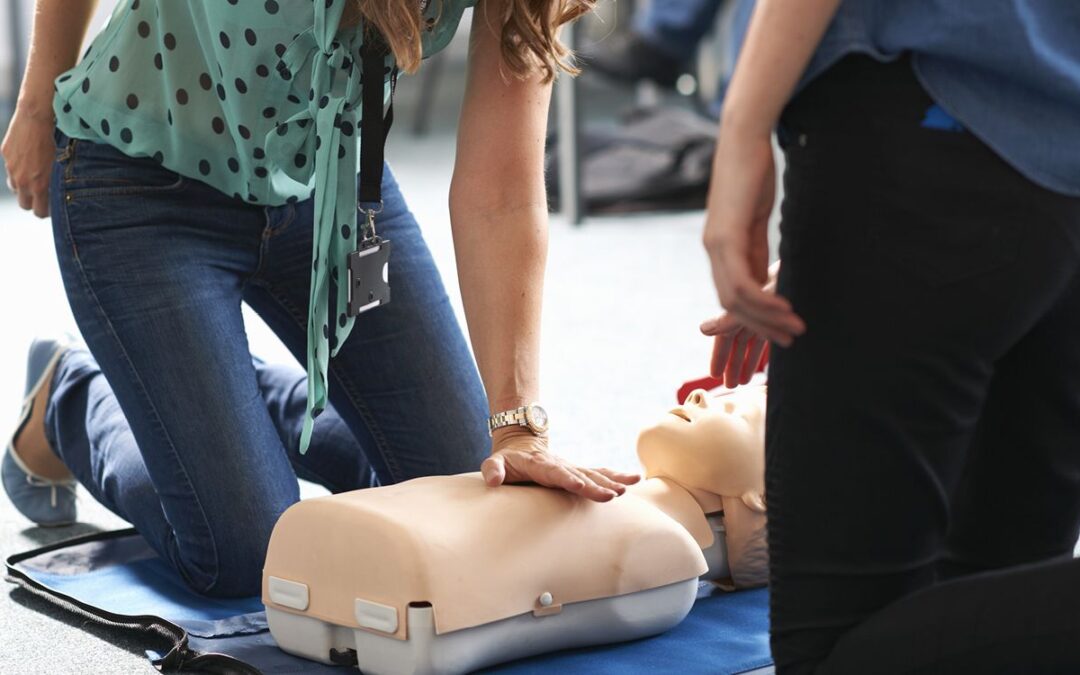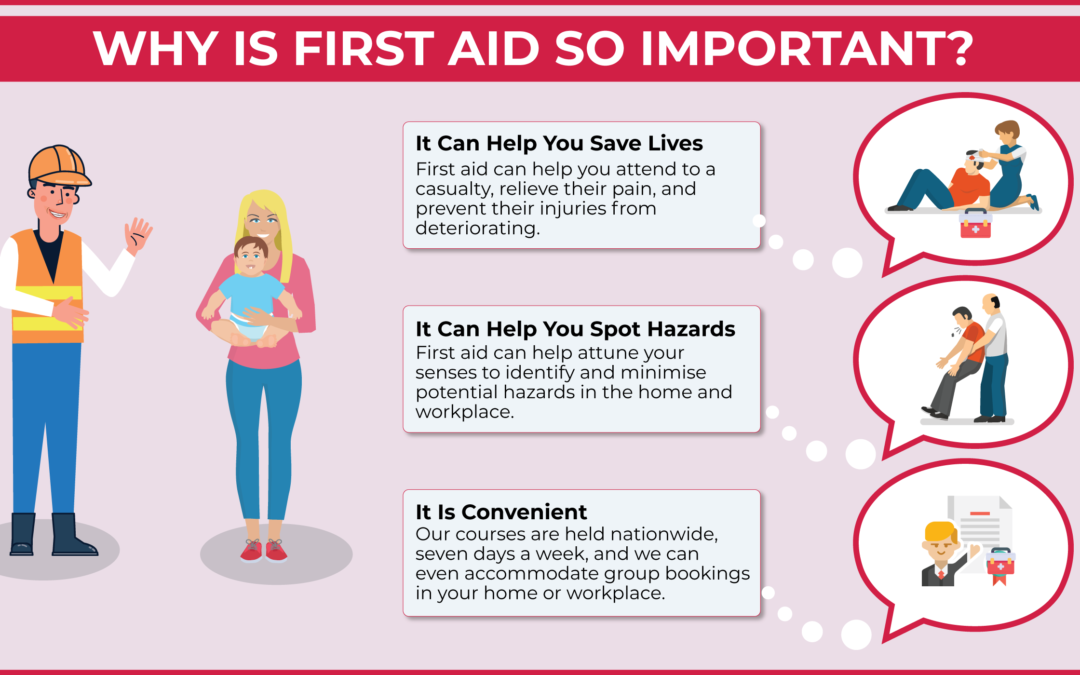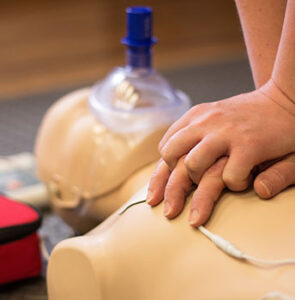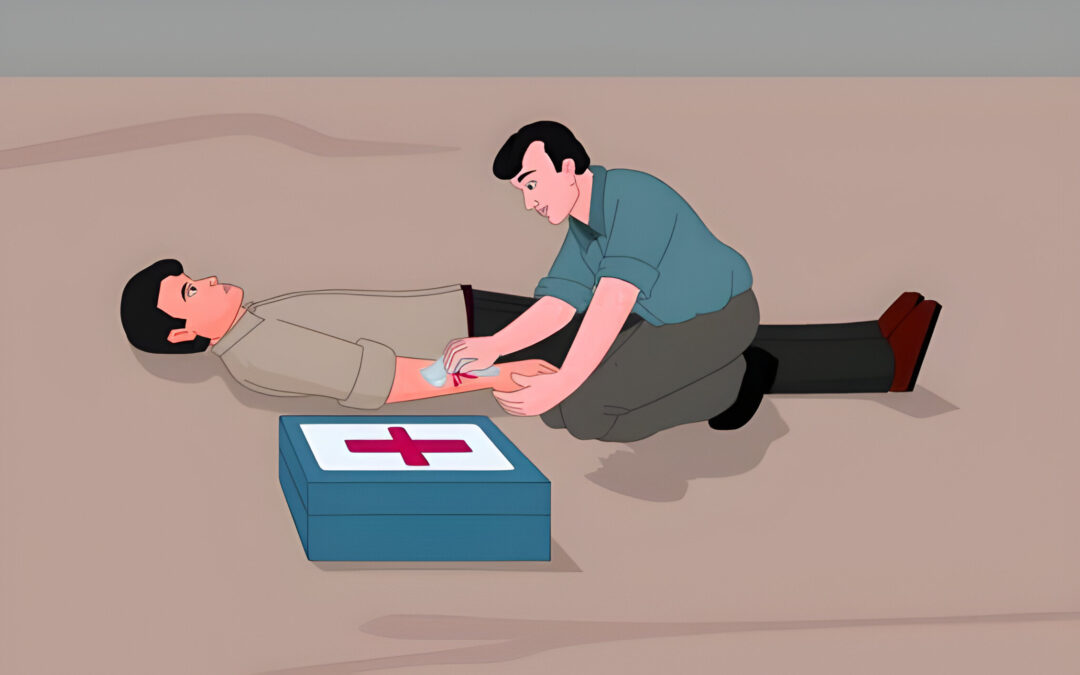
by admin | Aug 31, 2024 | blog
What You Will Learn in a Basic First Aid Course
Introduction
A basic first aid course is a fundamental step toward being prepared to handle emergencies effectively. These courses provide essential knowledge and skills that can be crucial in various situations, from everyday accidents to critical emergencies. This article explores the core components of a basic first aid course, detailing what you will learn and how this training can make a significant difference in your ability to respond to medical incidents.
Understanding First Aid Fundamentals
1. Definition and Principles of First Aid
A basic first aid course starts with an overview of what first aid is and its fundamental principles. First aid involves providing immediate care to someone who is injured or ill until professional medical help arrives. The principles taught include:
Preserving Life: Ensuring that the injured or ill person’s life is preserved.
Preventing Further Harm: Taking steps to prevent the situation from worsening.
Promoting Recovery: Providing care that helps in the healing process.
2. Legal and Ethical Considerations
Understanding the legal and ethical aspects of first aid is crucial. This includes knowing:
Consent: How to obtain consent from the injured person before providing aid.
Duty of Care: Understanding your responsibilities and limitations when providing first aid.
Legal Protection: Awareness of legal protections and potential liabilities associated with first aid.
Basic Life Support Techniques
1. Cardiopulmonary Resuscitation (CPR)
CPR is a critical component of basic first aid training. The course covers:
Recognizing Cardiac Arrest: Identifying signs of cardiac arrest and when to perform CPR.
Performing Chest Compressions: Proper technique and depth for chest compressions.
Giving Rescue Breaths: How to provide effective rescue breaths to assist with breathing.
Basic first aid courses often include training on using an AED, which involves:
Understanding AED Functionality: How AEDs work and their role in cardiac emergencies.
Proper AED Usage: Steps for applying AED pads and following device prompts to deliver a shock if needed.
3. Recovery Position
Learning how to place someone in the recovery position is essential for:
Maintaining Open Airway: Ensuring that the person’s airway remains clear.
Preventing Choking: Reducing the risk of choking on vomit or fluids.
Managing Common Injuries and Illnesses
1. Wound Care and Bleeding Control
The course teaches you how to handle various types of wounds and bleeding, including:
Cleaning and Dressing Wounds: Techniques for cleaning wounds and applying dressings to prevent infection.
Controlling Bleeding: Methods for applying pressure, using bandages, and elevating limbs to manage bleeding.
2. Treating Burns
You will learn how to manage burns, including:
Cooling Burns: Applying cool water to burns to reduce pain and damage.
Covering Burns: Using sterile dressings and avoiding common mistakes like using ointments.
3. Recognizing and Responding to Shock
The course covers signs of shock and how to respond, including:
Symptoms of Shock: Identifying signs such as pale skin, rapid breathing, and confusion.
Managing Shock: Techniques for positioning the person, maintaining body temperature, and providing reassurance.
Responding to Medical Emergencies
1. Choking Emergencies
Learning how to handle choking emergencies involves:
Recognizing Choking: Signs that someone is choking and cannot breathe.
Performing Heimlich Maneuver: Techniques for administering abdominal thrusts to expel an obstruction.
2. Recognizing and Treating Allergic Reactions
The course includes information on managing allergic reactions, including:
Identifying Severe Allergic Reactions: Symptoms of anaphylaxis, such as swelling and difficulty breathing.
Using EpiPens: Proper use of epinephrine auto-injectors for severe allergic reactions.
3. Managing Seizures
You will learn how to respond to seizures, including:
Understanding Seizure Types: Recognizing different types of seizures and their symptoms.
Providing Safe Care: Ensuring safety during a seizure and what to do afterward.
Special Considerations
1. First Aid for Children and Infants
Basic first aid courses often include specific training for handling emergencies involving children and infants:
Differences in Techniques: Adapting techniques for smaller bodies and different developmental stages.
Common Pediatric Emergencies: Addressing issues like choking, fever, and falls.
2. First Aid in Different Environments
Training may cover first aid considerations in various settings, such as:
Workplace First Aid: Handling injuries common in specific work environments.
Outdoor and Remote Areas: Adapting first aid techniques for situations where professional help may be delayed.
Practical Skills and Hands-On Training
1. Simulations and Role-Playing
Basic first aid courses include practical exercises and role-playing scenarios to:
Practice Techniques: Apply learned skills in simulated emergency situations.
Build Confidence: Gain hands-on experience to enhance your response in real-life situations.
2. Skills Assessment
Courses often include assessments to:
Evaluate Competency: Demonstrate your ability to perform first aid techniques correctly.
Receive Feedback: Get guidance on improving your skills and addressing any weaknesses.
Conclusion
A basic first aid course provides essential training that equips you with the skills and knowledge needed to respond effectively to emergencies. From fundamental principles and basic life support techniques to managing common injuries and medical emergencies, this training prepares you to handle a wide range of situations. By participating in a basic first aid course, you not only gain valuable life-saving skills but also contribute to creating a safer environment for yourself and those around you.

by admin | Aug 31, 2024 | blog
How to Renew Your First Aid Certification
Introduction
First aid certification is essential for maintaining preparedness and safety in various environments, from workplaces to community settings. However, certifications are not permanent and require renewal to ensure that skills and knowledge remain current. This article provides a comprehensive guide on how to renew your first aid certification, including understanding renewal requirements, preparing for renewal, and completing the renewal process.
Understanding Renewal Requirements
1. Certification Expiration
First aid certifications typically have an expiration date, usually ranging from two to three years from the date of issuance. It is crucial to be aware of this expiration date to avoid lapsing in certification. Check your certification card or documentation for the specific expiration date.
2. Renewal Criteria
Each certification body or course provider has specific renewal criteria. Generally, you will need to:
Complete a Renewal Course: Most certifications require completion of a renewal or refresher course to update your skills and knowledge.
Demonstrate Competency: You may need to demonstrate your ability to perform first aid techniques effectively.
Pay Renewal Fees: Renewal typically involves a fee, which varies depending on the provider and the level of certification.
3. Keeping Up-to-Date
First aid practices and guidelines can evolve over time. Staying informed about the latest updates and best practices ensures that you are prepared to handle emergencies effectively. Many certification programs provide updates on changes to protocols and techniques, which will be covered in renewal courses.
Preparing for Renewal
1. Review Certification Requirements
Before enrolling in a renewal course, review the specific requirements of your certification. Different organizations may have varying renewal processes, so it is important to understand what is expected. Check the certification body’s website or contact them directly for detailed information.

How to Renew Your First Aid Certification
2. Enroll in a Renewal Course
Choose a renewal course that is recognized by the certifying organization. Many organizations offer online, in-person, or blended renewal courses. Select a format that best fits your schedule and learning preferences. Ensure the course provider is accredited and meets the standards set by the certification body.
Prepare any necessary documentation for the renewal process. This may include:
Current Certification Card: Proof of your existing certification.
Identification: Government-issued ID for verification purposes.
Proof of Previous Training: If required, provide evidence of your previous first aid training.
4. Review Course Materials
Before attending the renewal course, review the course materials and guidelines. Refresh your knowledge on key first aid techniques, procedures, and emergency protocols. Many renewal courses provide study materials or online resources to help you prepare.
Completing the Renewal Process
1. Attend the Renewal Course
Participate in the renewal course as scheduled. Engage actively in the course to ensure you absorb the updated information and practice the necessary skills. Renewal courses typically include:
Updated Guidelines: Information on any changes to first aid practices and protocols.
Practical Exercises: Hands-on practice of first aid techniques and scenarios.
Assessment: Tests or evaluations to demonstrate your competency in first aid skills.
2. Pass the Assessment
Most renewal courses require you to pass an assessment or practical exam to demonstrate your proficiency. This assessment may include written tests and practical demonstrations of first aid techniques. Ensure you understand the assessment criteria and prepare accordingly.
3. Receive Your Updated Certification
Upon successful completion of the renewal course and assessment, you will receive an updated certification card or documentation. Verify that the information is correct and that the certification reflects the new expiration date. Keep your certification card in a safe and accessible place.
Maintaining Your Certification
1. Track Expiration Dates
Keep track of your certification’s expiration date to ensure you renew it before it lapses. Set reminders well in advance to allow ample time for renewal and to avoid any gaps in certification.
2. Continue Professional Development
Consider engaging in additional training or professional development opportunities related to first aid and emergency response. Staying updated with the latest advancements and best practices enhances your skills and readiness.
3. Encourage Others to Renew
If you are part of a workplace or community organization, encourage others to renew their first aid certifications as well. A well-trained team ensures a safer environment and enhances overall preparedness.
Conclusion
Renewing your first aid certification is a vital step in maintaining your ability to respond effectively to emergencies. By understanding the renewal requirements, preparing appropriately, and completing the renewal process, you ensure that your skills and knowledge remain current. Regular renewal not only helps you stay compliant with certification standards but also contributes to a safer and more prepared environment for yourself and others. Invest in your first aid training renewal to uphold your readiness and commitment to safety.

by admin | Aug 30, 2024 | blog
Why Every Business Should Invest in First Aid Training
Introduction
Why Every Business Should Invest in First Aid Training. Investing in first aid training is not just a legal obligation for businesses; it is a crucial step toward creating a safer, more responsive workplace. Proper first aid training equips employees with the skills and knowledge necessary to handle emergencies efficiently, mitigating risks and enhancing overall workplace safety. This article explores the compelling reasons why every business should prioritize first aid training.
Enhancing Workplace Safety
1. Immediate Response to Injuries
In any workplace, accidents and medical emergencies can occur unexpectedly. First aid training ensures that employees are prepared to respond promptly to injuries, from minor cuts and bruises to more serious incidents. This immediate response can prevent minor injuries from worsening and can stabilize individuals until professional medical help arrives.
2. Reducing the Severity of Injuries
Effective first aid can significantly reduce the severity of injuries. Trained employees know how to manage bleeding, administer CPR, and handle various types of trauma. By addressing injuries quickly and correctly, businesses can minimize the impact of accidents, potentially saving lives and reducing recovery times.
3. Creating a Safer Work Environment
Investing in first aid training demonstrates a commitment to workplace safety. It helps to foster a culture of preparedness and responsibility, where employees feel valued and protected. This proactive approach contributes to a safer work environment, reducing the likelihood of accidents and ensuring that everyone knows how to respond in emergencies.

Why Every Business Should Invest in First Aid Training
1. Meeting Regulatory Standards
Many jurisdictions have legal requirements regarding workplace safety and first aid. For instance, regulations often mandate that businesses have trained first aid personnel on site. By investing in first aid training, businesses ensure they comply with these regulations, avoiding potential fines and legal issues.
2. Avoiding Legal Liabilities
Failure to provide adequate first aid training can result in legal liabilities if an incident occurs and it is found that the business was not prepared. Investing in training helps to mitigate these risks by demonstrating that the business has taken reasonable steps to ensure the health and safety of its employees.
3. Enhancing Insurance Coverage
Some insurance policies may offer better coverage or lower premiums for businesses that have implemented comprehensive safety measures, including first aid training. By investing in training, businesses can potentially benefit from improved insurance terms and reduce the financial impact of workplace accidents.
Boosting Employee Confidence and Morale
1. Empowering Employees
First aid training empowers employees by providing them with the skills to handle emergencies effectively. This empowerment boosts their confidence in managing potentially life-threatening situations, enhancing their sense of security and competence within the workplace.
2. Improving Job Satisfaction
Knowing that they are well-prepared to respond to emergencies can improve employees’ job satisfaction. It creates a supportive work environment where employees feel valued and cared for. This positive environment can lead to increased morale and a more engaged workforce.
3. Fostering Team Cohesion
First aid training often involves collaborative exercises and simulations. These activities not only improve first aid skills but also foster teamwork and communication among employees. Strengthening these relationships can lead to better cooperation and a more cohesive work environment.
Preparing for Emergency Situations
1. Effective Emergency Response
In emergencies, every second counts. First aid training prepares employees to act swiftly and effectively, providing critical care during medical incidents. This preparedness ensures that the business can handle emergencies efficiently, reducing the risk of complications and improving overall outcomes.
2. Implementing Emergency Protocols
Training helps employees understand and implement emergency protocols and procedures. Knowing how to evacuate a building, respond to fires, or manage other emergencies ensures that employees can act according to established procedures, enhancing the overall safety and efficiency of the response.
3. Managing Specific Workplace Risks
Different workplaces have unique risks and hazards. First aid training can be tailored to address specific workplace risks, such as chemical spills, machinery accidents, or health emergencies related to the industry. Customized training ensures that employees are prepared to handle the particular challenges of their work environment.
Improving Business Continuity
1. Minimizing Downtime
Accidents and emergencies can disrupt business operations. By having trained first aid personnel on site, businesses can manage incidents more effectively, reducing downtime and maintaining operational continuity. This preparedness ensures that the business can continue functioning smoothly, even during emergencies.
2. Supporting Crisis Management
First aid training is an integral part of crisis management plans. It helps businesses develop comprehensive strategies for handling emergencies, including first aid response. Effective crisis management supports business resilience and stability, ensuring that the organization can navigate and recover from incidents more efficiently.
3. Enhancing Reputation and Trust
A business that prioritizes first aid training demonstrates its commitment to employee well-being and safety. This commitment enhances the business’s reputation and fosters trust among employees, clients, and stakeholders. A positive reputation for safety and preparedness can also be a competitive advantage in attracting and retaining top talent.
Choosing the Right First Aid Training
1. Assessing Business Needs
Determine the specific first aid training needs based on the nature of your business, the potential risks, and the size of your workforce. This assessment will help in selecting the most appropriate training course and ensuring that it meets the requirements of your workplace.
2. Selecting Accredited Providers
Choose training providers that are accredited and recognized by relevant authorities. Accredited courses adhere to industry standards and provide high-quality training that meets regulatory requirements.
3. Implementing Ongoing Training
First aid skills can become outdated, so it’s important to implement a schedule for ongoing training and refresher courses. Regular updates ensure that employees remain current with the latest practices and guidelines, maintaining a high level of preparedness.
Conclusion
Investing in first aid training is a critical step for every business. It enhances workplace safety, ensures compliance with legal requirements, boosts employee confidence and morale, and improves emergency preparedness. By selecting the right training and implementing ongoing education, businesses can create a safer, more resilient work environment, ultimately benefiting both employees and the organization as a whole. Prioritizing first aid training demonstrates a commitment to employee well-being and safety, contributing to a positive and productive workplace.

by admin | Aug 30, 2024 | blog
First Aid Courses: From Basics to Advanced Techniques
Introduction
First aid courses are vital for equipping individuals with the skills needed to handle emergencies effectively. These courses range from basic first aid skills to advanced techniques, catering to various needs and settings. Understanding the spectrum of first aid training helps individuals choose the right course for their needs and ensures they are prepared to respond to a wide range of medical emergencies. First Aid Courses: From Basics to Advanced Techniques
Basic First Aid Courses
1. Overview of Basic First Aid
Basic first aid courses provide foundational knowledge and skills necessary to address common injuries and medical situations. These courses cover essential techniques that everyone should know, whether in a home, community, or workplace setting. They focus on immediate care to stabilize an individual until professional help arrives.
2. Key Skills Covered
Basic first aid training includes:
Wound Care: Techniques for cleaning and dressing cuts, scrapes, and minor injuries to prevent infection and promote healing.
Burn Treatment: Methods for treating different types of burns, including minor and severe burns, to alleviate pain and prevent complications.
Fracture Management: Basic immobilization techniques for suspected fractures or sprains to prevent further injury.
Choking Relief: Procedures for relieving choking in adults, children, and infants, including the Heimlich maneuver and back blows.
CPR (Cardiopulmonary Resuscitation): Basic CPR techniques to restore breathing and circulation in individuals experiencing cardiac arrest.
3. Benefits of Basic First Aid Training
Basic first aid courses are beneficial for:
Everyday Situations: Providing immediate care for common injuries and medical issues that can occur in daily life.
Workplace Safety: Enhancing safety and preparedness in various work environments.
Family and Community: Offering critical skills for parents, caregivers, and community members to manage emergencies effectively.

First Aid Courses: From Basics to Advanced Techniques
Intermediate First Aid Courses
Intermediate first aid courses build on the foundational skills learned in basic courses. They delve deeper into more complex situations and provide additional techniques for managing a wider range of medical emergencies. These courses are suitable for those who need more comprehensive training or wish to advance their skills.
2. Key Skills Covered
Intermediate first aid training includes:
Advanced Wound Care: Techniques for treating more severe wounds, including wound cleaning, suturing basics, and managing bleeding.
Shock Management: Understanding and managing different types of shock, including symptoms and treatment strategies to stabilize the patient.
Medical Emergencies: Recognition and initial management of common medical emergencies such as diabetic emergencies, seizures, and allergic reactions.
Transporting Injured Individuals: Safe methods for moving and transporting injured individuals, including the use of splints and stretchers.
3. Benefits of Intermediate First Aid Training
Intermediate courses provide:
Enhanced Skills: More detailed techniques for managing severe injuries and medical conditions.
Professional Use: Ideal for individuals in roles that require a higher level of first aid knowledge, such as workplace safety officers and community volunteers.
Increased Confidence: Improved ability to handle a broader range of emergency situations effectively.
Advanced First Aid Courses
1. Comprehensive and Specialized Training
Advanced first aid courses offer in-depth training and specialized techniques for handling complex and high-risk medical emergencies. These courses are designed for professionals and individuals who need advanced skills beyond basic and intermediate training.
2. Key Skills Covered
Advanced first aid training includes:
Advanced Trauma Management: Techniques for managing severe trauma, including severe bleeding, multiple injuries, and complex fracture management.
Advanced Cardiac Life Support (ACLS): In-depth CPR techniques, including advanced airway management, defibrillation, and pharmacological interventions.
Emergency Medical Response: Handling critical medical situations such as heart attacks, strokes, and respiratory emergencies with advanced procedures and equipment.
Specialized Scenarios: Training for specific environments or roles, such as wilderness first aid, industrial safety, or first aid in childcare settings.
3. Benefits of Advanced First Aid Training
Advanced courses offer:
Expert-Level Skills: High-level techniques and knowledge for managing severe and complex medical emergencies.
Professional Requirements: Essential for healthcare professionals, emergency responders, and those in specialized roles requiring advanced first aid capabilities.
Increased Preparedness: Enhanced ability to handle critical situations effectively and make informed decisions under pressure.
Choosing the Right First Aid Course
1. Assessing Your Needs
Selecting the appropriate first aid course depends on your specific needs and goals. Consider factors such as the type of environment you are in (home, workplace, community), your role, and any regulatory requirements that may apply.
2. Course Accreditation and Providers
Ensure that the course is accredited and offered by a reputable provider. Accredited courses adhere to established standards and guidelines, ensuring that the training is comprehensive and recognized by relevant authorities.
3. Course Format and Flexibility
First aid courses are available in various formats, including in-person, online, and blended options. Choose a format that fits your schedule and learning preferences. In-person courses offer hands-on practice, while online options provide flexibility for self-paced learning.
Conclusion
First aid courses range from basic to advanced levels, each offering unique skills and knowledge for managing different types of emergencies. Basic courses provide foundational skills, intermediate courses expand on those skills, and advanced courses offer specialized training for complex scenarios. By choosing the right course based on your needs and goals, you can ensure that you are well-prepared to handle medical emergencies effectively and confidently. Investing in first aid training not only enhances your ability to respond to emergencies but also contributes to a safer and more prepared environment for yourself and others.

by admin | Aug 29, 2024 | blog
Why First Aid Training is Essential for Every Workplace
Introduction
First aid training is a crucial component of workplace safety that should not be overlooked. It provides employees with the skills and knowledge needed to respond effectively to emergencies, ensuring a safer and more prepared work environment. From preventing minor injuries from escalating to managing serious health crises, first aid training plays a vital role in workplace safety and compliance.
Understanding the Importance of First Aid Training
1. Enhancing Workplace Safety
Workplace safety is a top priority for any organization. First aid training equips employees with the ability to handle injuries and medical emergencies promptly, reducing the risk of serious complications. By knowing how to perform basic first aid procedures, such as treating cuts, burns, and sprains, employees can address issues before they worsen, creating a safer work environment for everyone.
2. Compliance with Legal Requirements
Many countries have stringent health and safety regulations that require workplaces to have trained first aid personnel. For instance, in Australia, the Work Health and Safety (WHS) Act mandates that businesses provide adequate first aid arrangements. Enrolling employees in first aid training ensures that your workplace complies with these legal requirements, avoiding potential fines and legal issues.
3. Reducing the Risk of Workplace Accidents
Accidents can happen at any time, and having trained staff on hand can significantly reduce the risk of serious injury. First aid training includes education on identifying and mitigating hazards, as well as providing immediate care during accidents. By addressing potential risks and knowing how to manage them, businesses can minimize the likelihood of accidents and injuries.
4. Improving Response Time in Emergencies
In emergency situations, every second counts. Employees who are trained in first aid can act quickly and efficiently, providing immediate care until professional medical help arrives. This swift response can make a significant difference in the outcome of an emergency, potentially saving lives and reducing the severity of injuries.

Why First Aid Training is Essential for Every Workplace
5. Boosting Employee Confidence and Morale
Knowing that they are prepared to handle emergencies can boost employees’ confidence and morale. First aid training empowers staff to take action in critical situations, reducing anxiety and fostering a sense of responsibility and competence. This increased confidence can translate into improved overall job satisfaction and a positive work environment. https://aimsinstitute.edu.au/
6. Providing a Structured Response to Medical Emergencies
First aid training provides a structured approach to handling medical emergencies, ensuring that employees follow established procedures and protocols. This structured response helps maintain order during chaotic situations, reducing confusion and ensuring that the appropriate care is administered promptly.
7. Enhancing Communication and Teamwork
Effective communication and teamwork are essential during emergencies. First aid training often involves scenario-based exercises that require participants to work together, improving their ability to communicate and collaborate under pressure. These skills are transferable to other aspects of workplace interactions, enhancing overall team cohesion.
8. Promoting a Culture of Safety
Investing in first aid training demonstrates a commitment to workplace safety and employee well-being. It promotes a culture of safety where employees are encouraged to prioritize health and safety practices. This proactive approach helps prevent accidents and injuries, creating a more secure and supportive work environment.
9. Supporting Business Continuity
Workplace accidents and medical emergencies can disrupt business operations and impact productivity. By having trained first aid personnel, businesses can minimize downtime and ensure that emergencies are managed effectively. This preparedness supports business continuity and helps maintain operations during critical situations.
10. Enhancing Customer and Client Confidence
For businesses that interact with customers and clients, having trained staff in first aid can enhance their confidence in your organization. Knowing that your workplace is equipped to handle emergencies effectively demonstrates a commitment to safety and professionalism, which can positively influence client perceptions and trust.
Choosing the Right First Aid Training for Your Workplace
1. Assess Your Workplace Needs
Different workplaces have varying needs based on their industry, size, and risk factors. Assessing these needs will help determine the most appropriate first aid training course. For example, a manufacturing facility may require more advanced training due to higher risk levels, while an office environment might need basic first aid skills.
2. Select Accredited Training Providers
Ensure that the first aid training provider is accredited and recognized by relevant health and safety authorities. Accredited providers offer courses that meet industry standards and guidelines, ensuring that employees receive high-quality and up-to-date training.
3. Consider Course Duration and Content
First aid courses vary in duration and content. Choose a course that fits your organization’s needs and schedule. Some courses may cover basic first aid, while others offer advanced training or specialized content, such as CPR or first aid for specific industries.
4. Implement Ongoing Training and Refreshers
First aid skills should be regularly updated to remain effective. Implementing a schedule for ongoing training and refresher courses ensures that employees stay current with the latest practices and guidelines. This ongoing education helps maintain a high level of preparedness and compliance.
Conclusion
First aid training is an essential component of workplace safety that provides numerous benefits, from enhancing safety and compliance to boosting employee confidence and morale. By investing in first aid training, businesses can create a safer work environment, improve emergency response, and support overall organizational effectiveness. Choosing the right training and ensuring ongoing education will contribute to a more secure and well-prepared workplace, ultimately benefiting employees, clients, and the organization as a whole.








